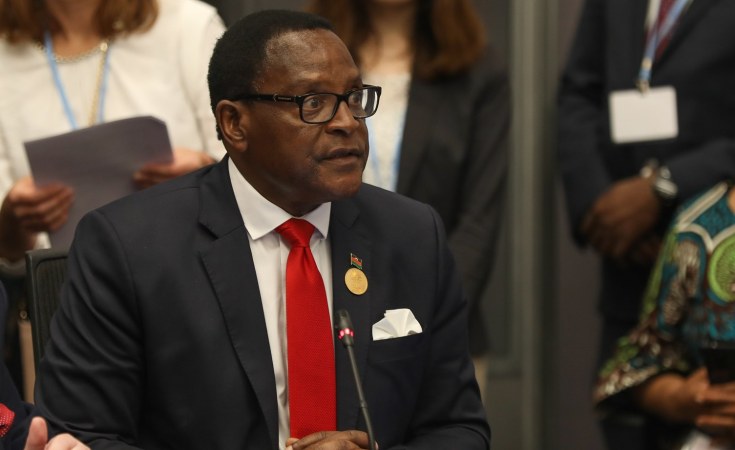The president's handling of Malawi's anti-graft czar raises doubts about his commitment to clean government.
Malawian President Lazarus Chakwera, who came into office with a halo over his head, seems to be digging himself ever deeper into trouble with his handling of his anti-corruption czar Martha Chizuma. Chakwera appointed her in April 2021 as Director-General of the powerful Anti-Corruption Bureau after her creditable performance as Ombudsman. But things have been going downhill since.
Chizuma had been vigorously investigating the ever-expanding corruption scandal emanating from bribes allegedly paid to senior Malawian government officials by Malawian-born British millionaire Zuneth Sattar in exchange for lucrative government contracts. Several top officials were charged, culminating last November when Vice-President Saulos Chilima was charged with taking a hefty bribe from Sattar.
But then in December, Chizuma was arrested, in an aggressive way, at her home in the middle of the night by armed police and taken off to a cell in her pyjamas.
The charges against Chizuma arose from remarks she made over a year ago in a telephone conversation with an unnamed person. She had been highly critical of the way Chakwera and other officials - including apparently the Director of Public Prosecutions Steve Kayuni - and some judges were handling corruption in Malawi. Her trusted but clearly untrustworthy interlocutor secretly recorded their conversation and then leaked it to the media, presumably to sabotage her investigations.
Chakwera came into office on a popular ticket to clean out corruption in Mutharika's administration
Some Malawians have accused Chizuma of unprofessional conduct, at the least, for speaking so candidly about her sensitive work. One wonders though, how remarks that Chizuma thought she was making in private could be construed as defamatory or illegal if her privacy was invaded.
The role of Chakwera himself in the saga has been the most worrying. He came into office on a popular ticket to clean out the corruption that had bedevilled his predecessor, Peter Mutharika's administration.
When Chizuma's candid remarks were leaked in January 2022, Chakwera stood by her, resisting political pressure to get rid of her. And when she was arrested last December on the instructions of chief prosecutor Kayuni, Chakwera ordered the charges dropped. He later instituted a commission of inquiry to investigate the circumstances surrounding her arrest.
Chakwera then fired Kayuni, suggesting he had pursued the charges against Chizuma to settle a personal score because she had criticised him in her leaked remarks. He repeated that he still considered Chizuma his champion against corruption. However he added, ominously, that the commission of inquiry had advised that anyone who felt injured by Chizuma's leaked remarks could file a complaint with the police.
In December, Chizuma was arrested, in an aggressive way, at her home in the middle of the night
This created space for Chakwera or his officials to pursue Chizuma, and indeed charges were laid against her. On 31 January, the Secretary to the President and Cabinet Colleen Zamba suspended Chizuma from her position as Anti-Corruption Bureau head. Although the High Court reversed her suspension, the Attorney General applied to overturn its reversal.
So are Chakwera and his government just following the letter of the law and the constitution, as he claimed? Civil society and Western diplomats think not. British Acting High Commissioner Sophia Willitts-King tweeted that her government was 'deeply concerned' by the pursuit of charges against Chizuma and her suspension.
Britain respected Chakwera's 'consistent calls to respect the rule of law. However, the law, police and judicial system should not be used to frustrate the will of the people,' she said. The United States (US) embassy was even stronger, saying the Malawi government's 'two months of harassment' of Chizuma had 'severely damaged the credibility of the fight against corruption.'
The US complained that no one had been held accountable for Chizuma's arrest, and the commission of inquiry report was unbalanced and hadn't addressed the violation of Chizuma's human rights. The embassy said that as Malawi's democratic partner, the US expected it to actively pursue corruption 'and not wage a campaign of intimidation against anti-corruption champions.'
The role of President Chakwera himself in the saga has been the most worrying
It appeared to hint that development assistance could be curtailed if its concerns weren't addressed. 'Our shared commitment to Malawi's development depends on trust that Malawi will use public resources, including development funds, transparently, fairly and with accountability.'
Some have called Chizuma Malawi's Thuli Madonsela - the former South African Public Protector who played a decisive role in toppling former president Jacob Zuma by accusing him of corruption and state capture. ISS Today asked Madonsela what she thought was happening to Chizuma. 'I think this is a reprisal,' because she had charged Chilima and others, she said. 'And it's improper because it is intimidation.'
Madonsela said it was regrettable that Chizuma had apparently not been supported by other state institutions such as the Auditor General and the international community. Madonsela herself had received such backing when she went after Zuma and others for corruption.
At the very least, Chakwera has handled this case clumsily. At worst - as the US, United Kingdom and others suggest - he is trying to hide government corruption by stifling his supposed chief corruption buster. Either way, Chakwera is proving to be far less than the leader Malawians pinned their hopes on after he ousted Mutharika nearly three years ago.
Peter Fabricius, Consultant, ISS Pretoria


